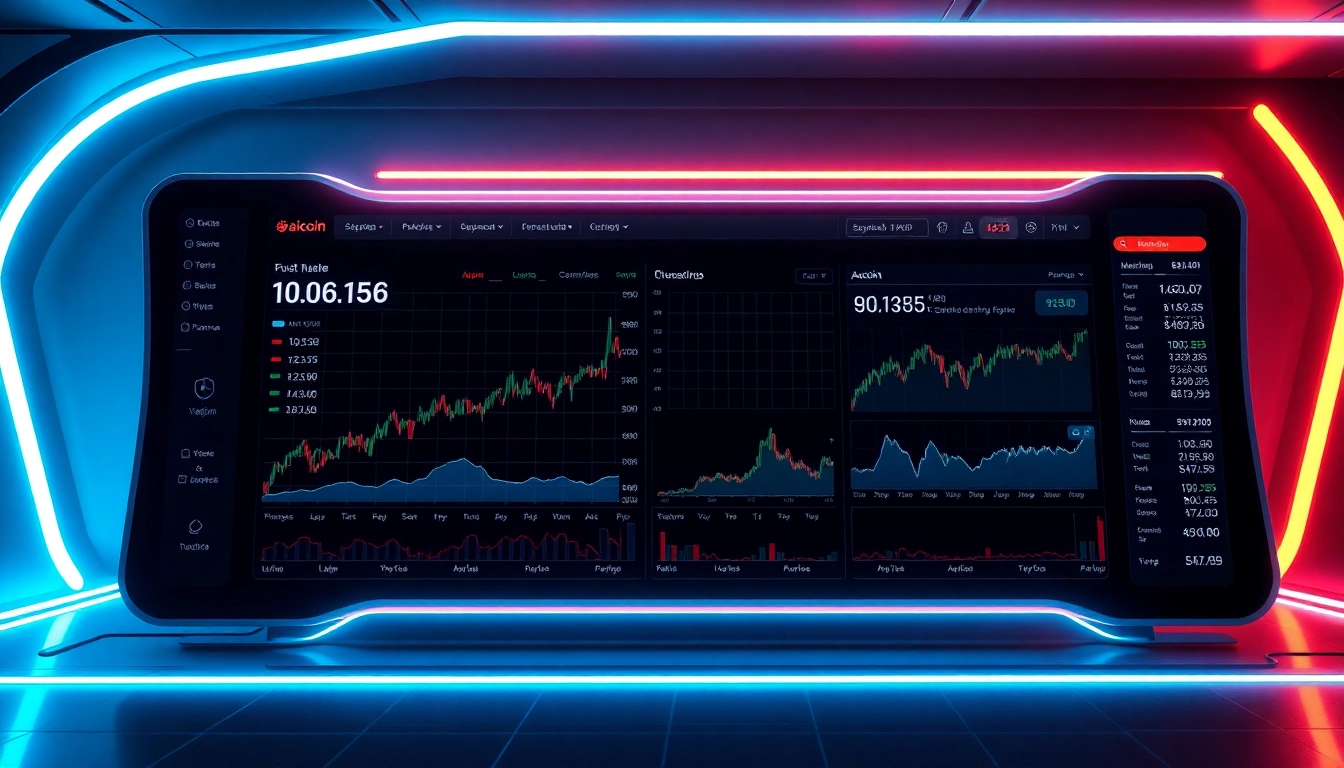Understanding Forex Brokerage Services in the UK
Embarking on a journey into forex trading within the United Kingdom demands a thorough understanding of how forex brokers operate and what distinguishes a top-tier provider. With the UK’s robust regulatory environment and a thriving financial industry, choosing the right broker can significantly influence your trading success. For traders aiming for safety, transparency, and competitive trading conditions, selecting a reputable Forex Broker UK is paramount. This guide explores the essential aspects of UK forex brokers, evaluates leading market options, and offers practical insights to help you make an informed decision.
What Defines a Trusted Forex Broker in the UK?
Trustworthiness in a forex broker hinges on multiple factors, but foremost among these is regulation. UK traders should prioritize brokers regulated by the Financial Conduct Authority (FCA), which enforces high standards of operational integrity, client fund protection, and fair trading practices. Trusted brokers also demonstrate transparency in their fee structures, provide reliable platforms, and uphold strict security protocols to safeguard trader data and funds.
Beyond regulation, other indicators include positive user reviews, industry reputation, competitive spreads and commissions, and quality of customer support. A broker that offers extensive educational resources and robust trading tools further enhances credibility by empowering traders to develop sound strategies.
Regulatory Framework and Compliance Standards
The UK’s financial industry is governed by the FCA, which mandates rigorous operational standards for licensed brokers. These include maintaining adequate capital reserves, implementing anti-money laundering procedures, and submitting to regular audits. FCA regulation provides traders with protection mechanisms such as client funds segregation, negative balance protection, and compensation schemes in case of broker insolvency.
When evaluating brokers, verify their FCA registration status via the FCA register and assess their level of compliance with current regulations. Regulatory adherence is a crucial factor that reduces the risk of fraud and malpractice, ensuring your trading activities are conducted within a secure legal framework.
Key Features to Look for in a Forex Broker
Selecting the right broker involves assessing several standing features:
- Regulation and Licensing: Ensure the broker is FCA-regulated.
- Trading Conditions: Look for tight spreads, low commissions, and leverage options suitable for your trading style.
- Platform and Technology: Choose platforms like MetaTrader 4/5 or proprietary platforms known for stability and advanced charting tools.
- Asset Coverage: A wide range of trading instruments including forex pairs, CFDs, commodities, and indices.
- Customer Support: Availability of multilingual, responsive support via multiple channels.
- Deposit and Withdrawal Methods: Secure, fast, and flexible options to facilitate smooth transactions.
- Educational Resources: Access to webinars, tutorials, and market analysis to support ongoing trader development.
Evaluating Top Forex Brokers in the UK Market
Comparison of Leading UK Forex Brokers
Market leaders such as IG, Saxo Bank, CMC Markets, and Pepperstone consistently rank highly due to their compliance, innovative platforms, and competitive offerings. For instance, IG offers a user-friendly interface, comprehensive research tools, and a range of asset classes, making it ideal for both beginners and experienced traders. Meanwhile, Pepperstone is renowned for its low spreads, fast execution speeds, and support for MetaTrader platforms.
While each broker caters to specific needs, the common thread among top contenders is their adherence to regulatory standards and their ability to deliver high-quality trading experiences.
Fee Structures, Spreads, and Trading Platforms
Trade costs significantly impact profitability. UK brokers typically offer either fixed or variable spreads, with some providing commission-based models. For example, commission-free brokers may offset this through wider spreads, whereas ECN accounts feature tighter spreads but charge commissions per trade. Evaluating these costs in relation to your trading frequency and style is essential.
Popular trading platforms such as MetaTrader 4 (MT4) and MetaTrader 5 (MT5) are favored due to their reliability, charting tools, automation capabilities, and widespread acceptance among brokers. Proprietary platforms, where available, often combine advanced features with tailored client support, enhancing overall trading performance.
User Reviews and Industry Reputation
Assessing user feedback from trusted review sites and trading communities provides practical insights into broker performance and client satisfaction. Look for consistent positive comments regarding execution speed, customer service, deposit processes, and platform stability. Conversely, be cautious of recurring complaints about withdrawal delays, hidden fees, or poor support, which may indicate underlying issues.
Industry awards and recognition further validate a broker’s standing. A reputable broker actively participates in industry events and maintains transparent communication channels, reinforcing their credibility.
How to Open and Optimize Your Forex Trading Account
Step-by-Step Account Setup Process
Initiating your trading journey involves several straightforward steps:
- Choose a regulated broker aligned with your trading goals.
- Register an account with personal details and agree to the broker’s terms.
- Complete identity verification via KYC procedures—upload ID documents and proof of address.
- Fund your account using secure payment options.
- Select a suitable trading platform and customize your workspace.
Most brokers simplify these steps through intuitive onboarding processes, ensuring swift access to markets.
Choosing the Best Trading Platform for Your Needs
Trading platforms such as MT4 and MT5 are industry standards, offering features like automated trading, advanced analysis, and mobile compatibility. When selecting a platform, consider factors like user interface, charting tools, order execution speed, and compatibility with your trading style.
Some brokers provide their own platforms or web-based solutions that integrate seamlessly with their services. Testing demo accounts helps determine which interface aligns best with your preferences.
Risk Management and Strategy Development
Effective risk management safeguards your capital. Techniques such as setting stop-loss and take-profit orders, limiting leverage, and maintaining a trading journal are fundamental. Developing a disciplined trading plan based on technical and fundamental analysis enhances consistency.
Regularly reviewing performance metrics and adjusting strategies in response to market conditions fosters continuous improvement and profitability.
Maximizing Trading Performance with Reliable Brokers
Utilizing Trading Tools and Resources
Leverage analytical tools like economic calendars, real-time news feeds, and algorithmic trading software to inform decisions. Many brokers offer integrated resources, including market analysis, signal services, and expert commentary, thereby empowering traders to make informed choices.
Monitoring Market Trends and News
Stay ahead in forex trading by actively following global economic indicators, geopolitical developments, and central bank policies. Timely news can influence currency movements, presenting opportunities or risks that skilled traders capitalize on.
Performance Metrics and Continuous Improvement
Track key performance indicators such as win rate, average profit/loss, and drawdown levels. Use these metrics to refine trading strategies, manage risk, and set realistic goals. Emphasizing education and ongoing skill development ensures sustained growth and adaptation to evolving markets.
Future Trends in the UK Forex Brokerage Industry
Emerging Technologies and Innovation
Artificial intelligence, machine learning, and blockchain are shaping the future of forex trading. Brokers adopting these innovations can offer smarter trading algorithms, enhanced security, and real-time analytics, providing traders with competitive advantages.
Regulatory Changes and Market Regulation
Regulatory frameworks continue to evolve, aiming to protect consumers and ensure market stability. Changes may include tighter leverage restrictions, enhanced disclosure requirements, and stricter compliance standards. Staying informed enables traders and brokers to adapt and maintain integrity in their operations.
Sustainable and Responsible Trading Practices
Growing emphasis on ethical trading includes promoting transparency, supporting financial literacy, and encouraging responsible leverage use. Brokers integrating environmental, social, and governance (ESG) principles foster a sustainable trading ecosystem that benefits both traders and the broader economy.



